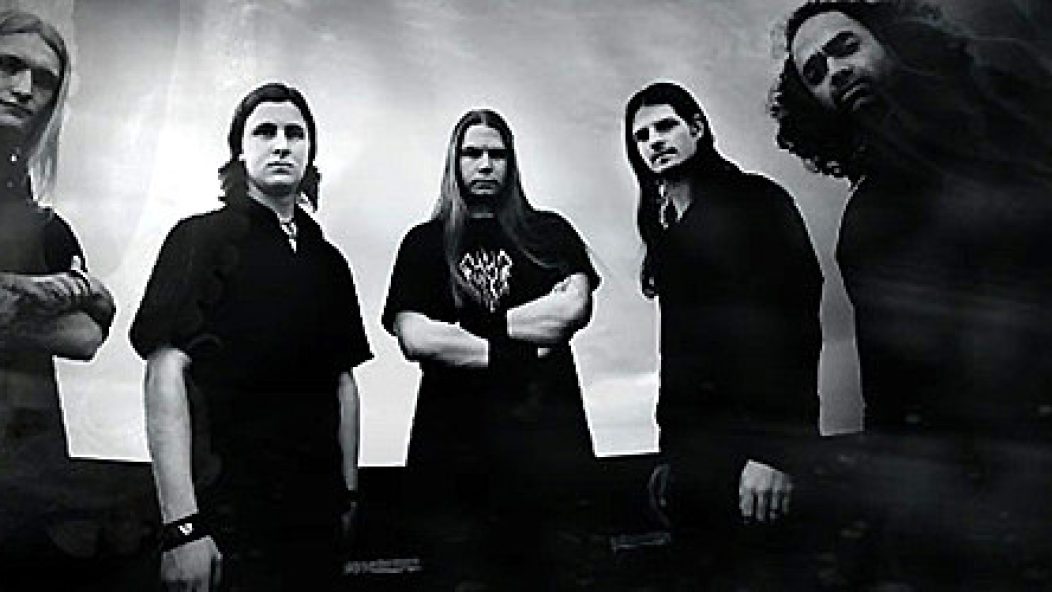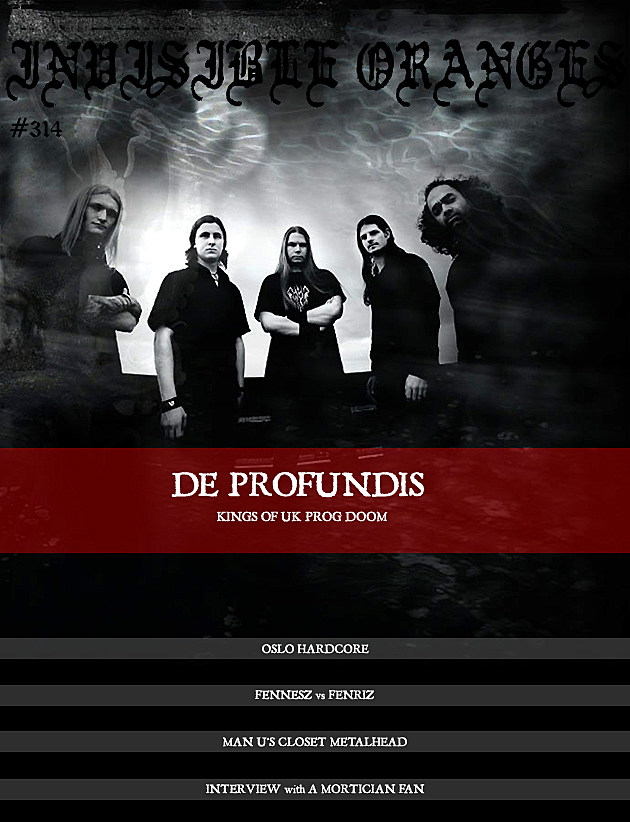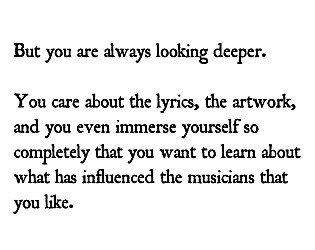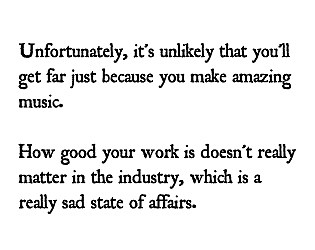
Interview: De Profundis
. . .
An impressive set at Infernal Damnation Festival led me to dig up on De Profundis. Given their relative obscurity, it came as a surprise when I learned that they were lucky enough to play large shows in countries as far as Romania, Greece, and India. It was also interesting to realise that despite being a young band, most of De Profundis’ members are seasoned metalheads since the late ’80s. I got together with frontman Craig Land to discuss cultural differences, the tribulations of promoting yourself in the underground, and the future of metal.
. . .
Given that you moved from South Africa to the UK 10 years ago, what can you tell me about the South African metal scene?
Well, I’ve been into metal for a long time, and I started listening to the more extreme side of it in 1988, when I was still too young to go to gigs and clubs. It was about 1992 when I first started to go to shows and became more involved in the local South African metal scene, pretty much when the first death metal band started to appear in the country. The city I’m from, Durban, had a miniscule scene – possibly about two or three bands, as compared to Johannesburg, which had a larger share. There were also one or two bands from Cape Town, but overall the South African scene was very, very small and insular.
You also couldn’t buy albums from bands overseas since it was really difficult. I remember hearing Sepultura on a radio metal show, and how much I wanted to check them out. Unfortunately, it was impossible to get such niché music back then without going through the lengthy process of using mail-order companies in the UK and mainland Europe. The gigs themselves were major events, because they didn’t happen too often. Hardly any local bands ever got to the point where they could put on shows, so when they did, it was quite a spectacle! The whole place would be chaos; everyone would just be moshing and getting crazy. I recall that for the first few gigs that I went to, I would come back covered in blood – unfortunately my own – but it was an awesome experience that hooked me for life!
The problem with the South African metal scene, though, was that it didn’t really evolve or go anywhere from those days. There are a few more bands nowadays, but I’m going back about 20 years ago. None of them have cracked it internationally, and there are still very few metal bands who come down to that country to play shows. We had Napalm Death and Carcass back in the day, but you get very little over there. It was really disheartening for me, because every new band that was coming out wanted to be the new Deicide or the new Pantera. No one was trying to push any boundaries, as they just wanted to rehash stuff which had already been done before abroad.
. . .
How did it compare to the English scene after moving overseas?
I was in a band which released an album in ’97, and the week after that our guitarist flew out to the United Kingdom to emigrate. Three years later, I was able to do the same thing.
The UK metal scene somewhat surprised me, as it was so cool to watch all the bands that I read about and been following from afar. To see them live in the flesh was fantastic, and my friends back in South Africa were extremely jealous about it! I understand that the UK’s had a bit of a bad reputation for a little while for not really producing anything of interest since probably the death metal explosion of the late ’80s to early ’90s. But I think that lately, the extreme metal scene is actually getting much better over here! There are some really good names that are starting to gain more recognition, like Wodensthrone, for one, who were at Infernal Damnation Festival in Camden earlier this year, where De Profundis had also played.
Though I have to say – you would have thought otherwise, but there are not a huge number of metalheads in London, surprisingly! Also, a lot of those that are in the capital tend to be foreigners, which is just as astonishing for those unfamiliar with the city’s multiculturalism and ethnic diversity.
. . .
. . .
Speaking of which, most of De Profundis are of different cultural backgrounds and experiences to most of the English metal scene. How would you say that this affects the band as outsiders even in the London scene?
Well, I don’t know how much it does, though we’re all from different backgrounds to one another. At one stage, De Profundis didn’t even have any British members at all; we were all foreigners. Then we got Nick Tingle (drummer) and Aaron McSporran (bassist) into our lineup, who are both English, so that has changed. As for the “foreign” side of the band, there’s our guitarist and the band’s co-founder Roman Subbotin who moved here from Russia about 10 years ago, myself from South Africa, and our other guitarist Shoi Sengupta, who’s French-born but of Indian descent. That’s another unique point to us, I suppose, as people don’t often see people of other races playing heavy metal. It’s normally seen as a “white man’s thing”.
We’ve all got different experiences and our own different thoughts about things, including the way that we grew up and our own cultures. I’d say that we all bring this together in an indirect way to De Profundis, which probably does colour the way in which we also write our music. I’d like to think that we come from a somewhat outsider direction in this regard as well, because we don’t try to fit into any category, and everyone has got their own diverse influences, which will always be there to the kind of music that we create.
Though it’s more challenging to be in a band where everyone has an equal say about the songwriting, because you might not agree with someone’s idea while four others might be in favour of it. If that person has a strong feeling about a particular part in a song, it’s up to them to change it so that the rest like what’s happening. It’s tricky, but it’s also more exciting as you get to incorporate things that you never would have thought of yourself!
In the beginning, I wanted De Profundis to be an extreme doom band, which everyone else wasn’t into. Roman was willing to learn about playing doom metal, but didn’t know about what I wanted to play. As it turned out, we never ended up playing doom metal and it was to our detriment for the first album that I had essentially forced the group to play in this genre. By the time we started writing for the second album, A Bleak Reflection, we decided that we wanted to change that and cut loose by playing whatever the hell we wanted!
. . .
From this point on, what are your thoughts on the other bands in the English scene as a whole and how your group compares to them?
Actually, there are a lot of bands in the same position as us, especially in London! Many have one or two foreigners in their lineups, so we can relate to them in that sense, though the English scene is really quite small. There are many bands, but people tend to keep to themselves in a way, which is perhaps to do with not wanting to be seen as a collective scene or as having a specific sound. I do know that a number of groups are playing a certain sound, and they tend to have other things in common aside from that. With a band like us, and others who are similar in the respect of trying to do something a little bit different, you like to try to isolate yourselves a little bit so that you’re not too influenced by what else is going on in the scene. At least for us, we try to not take much influence from what’s happening locally or currently. We try to look to the past, and I don’t even like looking at what’s going on further afield nowadays for inspiration or influence myself.
But in terms of getting along with other bands, well, we’re not a party band, but we have good friends in other groups. There’s a mutual respect amongst everyone, as we all know how hard it is to write your own music and then get up on stage after spending so many years learning how to play your instruments. It takes guts, and it takes a lot of commitment. Anybody who’s gotten so far, that they can get up on stage and play to an audience that enjoys their music, earns a lot of respect from us!
. . .
. . .
Another factor I’m curious about is age, since there are also notable age differences between members in your band. Being one of the older people involved in an underground band, what are your own observations on younger people in the metal world?
We’ve played with quite a few bands where the members are about Nick and Roman’s age (23) or even younger, and their standard of musicianship is fantastic. The youngsters really know how to play their instruments! It’s heartening to see that there seem to be a sort of backlash from them against all of the more popular, trendy music out there on channels like Scuzz TV [UK rock and metal channel] or covered in magazines like Kerrang! and so on. At least in terms of the bands that I know and have played with, the youngsters are listening to and getting informed by older music, rather than the trends of today. I think that not only does it bode well for their future, but that it’s likely why the UK scene is actually becoming stronger as compared to the time between the ’90s and the early ’00s, when it was considered to be following trends like nu-metal. This is probably why very little of worth was coming out of Britain at the time, though I believe that this is changing because people are opening up their ears and choosing not to go along with whatever is commercially in vogue.
Unfortunately, it’s unlikely that you’ll get far just because you make amazing music. How good your work is doesn’t really matter in the industry, which is a really sad state of affairs. It actually depends on how well you market yourself that people get to know you, and how much you can be pushed by those with enough money to do so. You can’t even get into a magazine nowadays based on how much they like your music. [It is] because your label takes out advertising space in order for the writers to do a short article about your band or review your album. That’s how it works in order to get noticed more, and when I found this out, I was really quite surprised!
. . .
What about the relative amount of success that De Profundis have had? It’s often mentioned how despite being an underground band, you guys had that live show in India, due to some dealings with Sony.
Well, we’re actually not particularly well-known anywhere! We did play a couple of high-profile gigs, but we’re in the position where the first album we did was self-financed, and the second one was self-recorded with a licensing deal. We were lucky in some regards, in that Sony putting out our album in India was obviously a big thing. But if you go there and have a look at their department stores, it’s pretty difficult to find them. Everything we’ve achieved so far has indeed been by sheer hard work and through self-investments into the band, though we’re getting to the stage where in order to reach further success, we have to pay even more than what we can afford. To get anywhere in the business, you need some outside investment, and there is no one doing that for De Profundis. (Sigh)
It’s relative success in that we’ve had a couple of tours and have been on some pretty big stages in front of some pretty big crowds, as well as a couple of albums under our belts. In that sense, I’m proud of what we’ve done, but in global terms, we’re just a tiny little group whom most metalheads following the underground haven’t even heard of. There are a limited number of big labels that deal in extreme music, and hundreds of thousands of bands out there. Most of whom won’t get signed up, as they lack the backing needed to grow. How are they going to get anywhere? Well, the simple answer is that they’re not. They’re going to stagnate, and they’re going to get frustrated before eventually calling it a day, which means that everyone is going to miss out on many killer bands because of the lack of investment.
. . .
. . .
It’s been noted that many are turning over to DIY ethics in order to survive, with some musicians not only setting up their own studios but also handling their own promotions and tours.
You can do that at the beginning, but we’re ambitious. We want to play bigger shows, we want to play bigger tours, and we want to go higher up on the bill where our albums get bigger distribution, and we get more coverage in various kinds of media. You can only do so much yourselves.
For instance, if you don’t have a contract with a label, you won’t get a festival as the organisers will overlook you if you’re unsigned. True, if you know someone who can help you, there will be a way around this, but you still won’t be taken seriously. You need a buy-on for tour support, since everything costs money. If you’re a millionaire who wants to do something by yourself, you might get a degree of success if you can afford it. It all boils down to the finances at the end of the day for the band, and how much they can really do
Not to mention what their ambitions are – is it to play a couple of local shows? Then you can probably get by on doing everything yourself. If you want to walk into a record shop like HMV and find your CD on the rack? It’s virtually impossible to do this through your own efforts. Getting signed to Kolony Records was vital for us after we shopped around for a good label, as we didn’t have to press the album ourselves or ask different magazines for reviews and interviews. That was now all being handled by our current label, as even though they’re a small company, they at least have a budget, which we didn’t have when we were previously going down the DIY route. It’s harder now to easily get onto a bigger record label, likely due to the obvious issue of illegally downloading songs as MP3s, which threw the whole industry into chaos. 20 years ago, the labels were more willing to take their chances, as they could experiment with different sounds a little bit and still make their money back and even take a loss on one band, knowing that they’d raise a higher income from the other groups under their wing. Sadly, this doesn’t happen now regardless of a band’s size or years of experience, since you can get the music for free through filesharing.
. . .
That’s an apt point about filesharing. There’s an argument between old school metalheads who support it and those who oppose it based on the past history of tape trading. Those in favour say that it’s very much similar to this once staple of the metal underground, whereas those against it consider this stance to be weak, as tape trading involved more personal investment and selection between people, unlike MP3s.
Funnily enough, I agree with both sentiments! The cool thing about tape trading was that it introduced me to so much music back when I was living in South Africa. I mentioned earlier that it wasn’t easily available, so this was pretty important for me back then. Later on when I could buy it, I did so as I would rather have the original hard copy than a taped version of it. If I got albums through tape trades which I didn’t particularly want to buy, then I still kept these versions, though they wouldn’t get many listens from me.
I doubt that this activity harmed musicians or bands very much at the time, being that you could only dub an album a few times before the tape copy wore out; its sound quality was also pretty horrendous! It’s unlikely that record labels felt any loss of sales because of it, since whatever “damage” was done was on a much smaller scale as compared to MP3 filesharing today. It’s even how a number of bands got their names spread throughout the underground of the metal world, like Death, Morbid Angel, and Obituary, who were well-known long before they had their debut albums out! With MP3s, you can take a song from an illegal Russian blog, for example, and become a fan without ever going ahead to buy the album. I also know about this, because we have a lot of Russian fans, and none of them have bought our album! As you can copy an MP3 a million times without any loss of sound quality, it’s easier for people to spread them around and copy them for their own possession.
With this in mind, it’s true that tape trading required a lot more time than MP3s. More of your time and effort were needed to do, it but it was also an enjoyable process. These days, people just go onto online blogs and download pretty much everything that’s coming out. I don’t even know if they get a chance to listen to what they’re downloading! I remember the excitement that I had whenever I got tapes in the mail, and how I practically devoured them – discovering new groups, listening to every little bit, and learning how to play air drums, just really immersing myself in the stuff! Now you don’t have to put any work in at all, and I don’t think that the people involved in filesharing spend their time being immersed in and listening to the music like they should, and like we the previous metal generation used to do. Music has become a commodity which many people don’t really care about, as opposed to something which is special to have.
. . .
. . .
Talk about the devaluing of music seems to just bring up nostalgic views of how this used to be different, years ago…
Well if you ask me, the best music is never going to be in the charts, and it’s never going to be popular, which is why you have all these boy bands and this autotuned R&B nonsense in the Top 40. You don’t have to have much intellect, as you basically get told what to listen to, and you do, like a robot. I’m going to get flak for saying that, but that’s what most people are, since they won’t investigate or explore what else is out there. I consider the metal scene to be pretty different in this regard, as you have more people who are willing to dig deep for their music, whether it’s also jazz, rock, or soul. I also quite like that metal is comparatively underground and not there for everyone, especially the good stuff.
It’s been commented that because metal hasn’t been in the charts for a long time, that the press are actually talking about the death of metal.
Nothing’s going to actually kill metal – even kids who are listening to hardcore bands and calling that “metal”. It irritates me a little bit, yet it’s not the case. Every couple of years, people are saying that the genre is dying or that it’s dead, that grunge killed metal, or even that hardcore or nu-metal killed metal. Nothing will kill it, because when you look at the underground scene at any given time, you’ll always find that there are a bunch of bands that are producing excellent work.
Obviously you need a certain personality to find those bands, as well as a certain appreciation for what they’re doing. But you are always looking deeper. You care about the lyrics, the artwork, and you even immerse yourself so completely that you want to learn about what has influenced the musicians that you like. For the guys in my band, it’s jazz and progressive rock that has influenced us. We want to be better players, so we like to dig into this and see what else we can find in history – the late ’60s to early ’70s for the prog stuff, and the early ’50s to late ’70s for the jazz. It’s a certain mindset where you have people who are eager to explore, which you don’t get from people more into mainstream music.
. . .
. . .
HEAR DE PROFUNDIS
. . .
BUY DE PROFUNDIS
The End (CD)
Amazon (MP3)
Bandcamp (MP3)
Kolony Records EU (CD)
. . .















